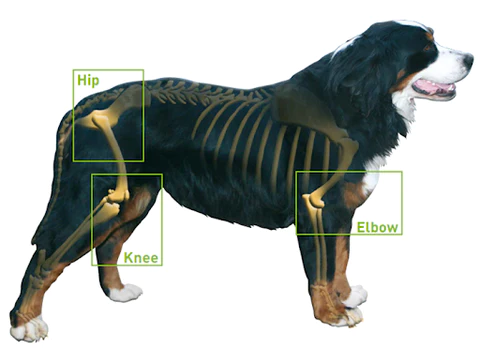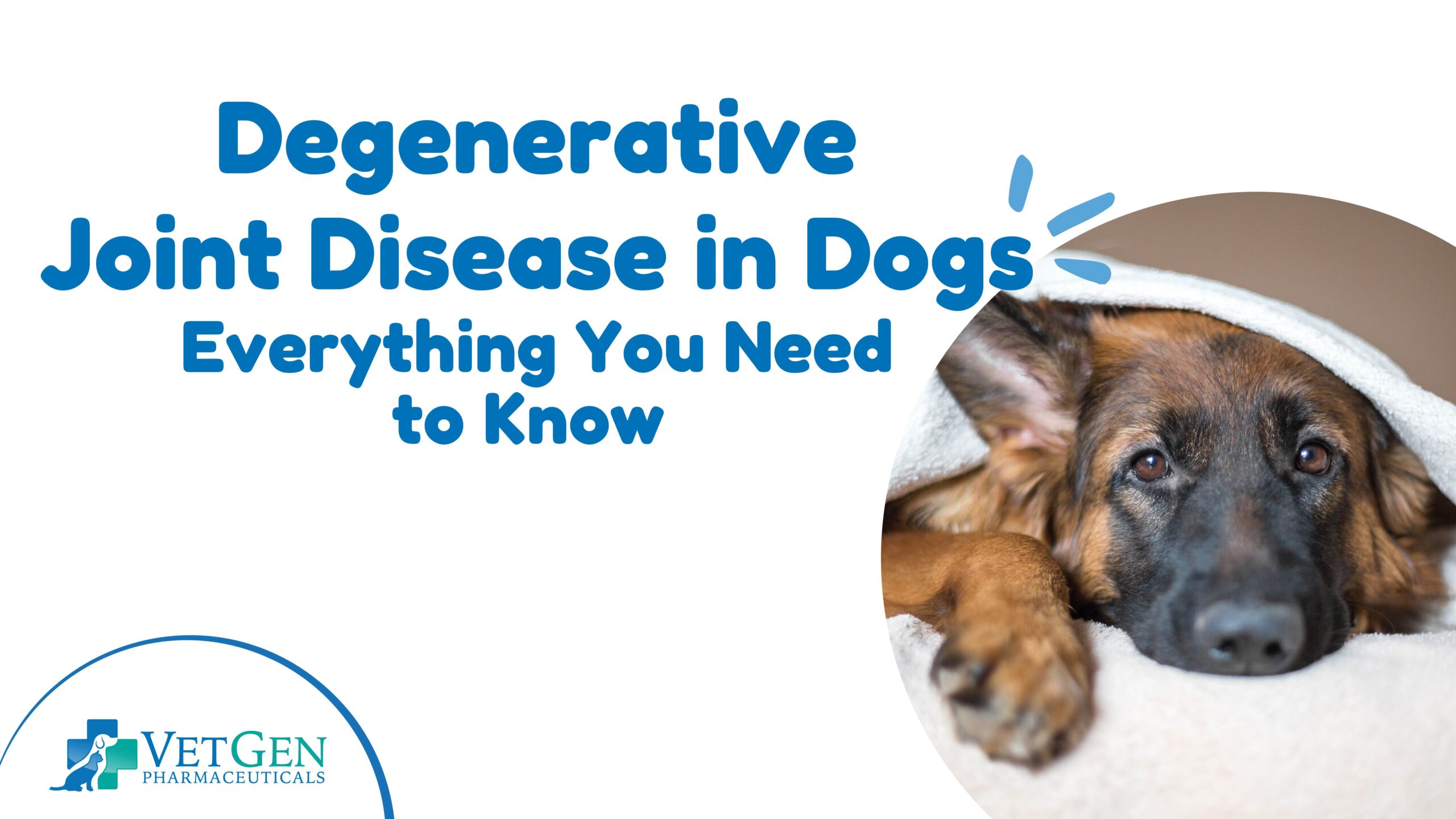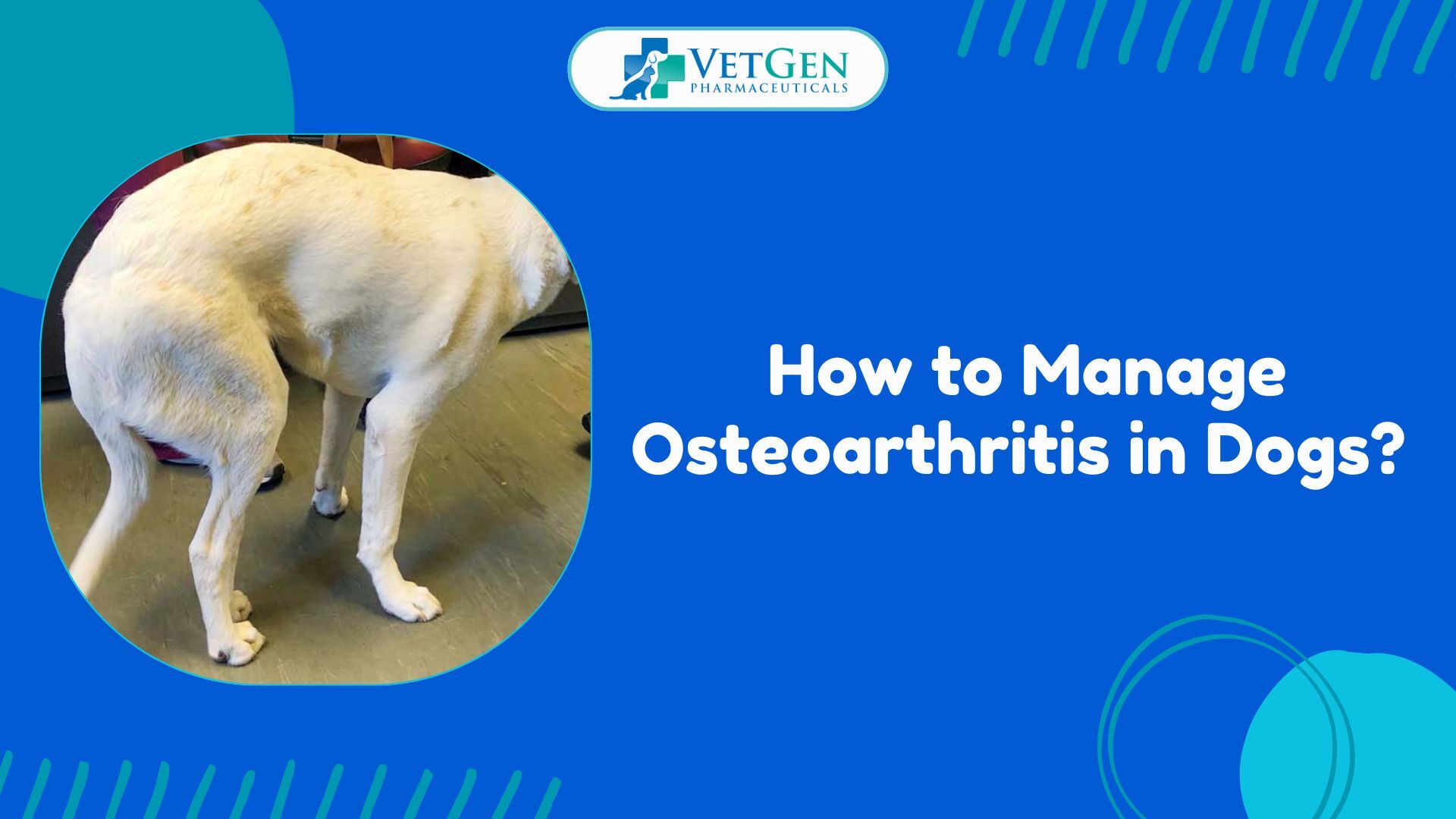We all dream of aging gracefully with our dogs. But we also have to acknowledge the fact that our canine companions reach the senior bracket quicker. Like humans, dogs’ joint tissues often wear down and deteriorate with age. The risk of developing painful and debilitating joint problems like arthritis and canine hip dysplasia. The most common form of arthritis in older dogs Degenerative Joint Disease (DJD) and can affect any joint in the body. But, the joints on the limbs and lower spine are more susceptible to DJD.

This common joint issue in senior dogs can impede mobility, disrupt your bonding time, and undermine your dog’s quality of life.
Early detection of DJD can help you reduce the progression rate and protect your dog’s mobility.
To help you protect your companion, here is everything you need to know about Degenerative Joint Disease in dogs.
How Does Degenerative Joint Disease Occur?
Also known as osteoarthritis, DJD is a progressively worsening inflammation of the joint due to the deterioration of articular cartilage.
The joint consists of several moveable parts held together by a capsule and a thin layer of the synovial membrane, which produces synovial fluid for lubrication.
In a healthy joint, there is a smooth layer of cartilage that allows for fluid movements.
As dogs grow older, articular cartilage lining the capsule joints may deteriorate and degenerate leading to DJD.
Gradual deterioration of the cartilage can lead to joint pains, inflammation, and the development of bone spurs.
In severe cases of osteoarthritis, degenerated articular cartilage can become brittle and split away from the bone.
It can lead to bone-to-bone grinding and impede the joints’ full range of motions. DJD can decrease your dog’s quality of life.
What are the Signs of DJD in Dogs?
Even dogs often try to hide their pain as much as possible, loving dog owners can sense when their furry friend is troubled.
The most obvious sign of DJD in dogs is lameness but this occurs when the condition is severe.
However, dogs with DJD display several other signs that can help you detect the condition early enough.
Signs of DJD in dogs include limping, sleeping more than usual, slower walking pace, difficulty standing up, stiffness, lethargy, irritability, and slouched posture.

Joint pain can also make your pal more reluctant to join your daily playtime, walks, and other physical activities.
Some dogs with DJD may sit with their hind legs stretched out or resent touching, petting, or brushing in certain areas.
If your dog exhibits these signs of osteoarthritis, you should visit your vet for a full physical examination.
Your vet can take X-rays of the affected joints to rule out other conditions with similar symptoms.
Like other joint issues in aging dogs, preventing the development of DJD is better than treatment.
Prevention Strategies for DJD in Dogs
While age plays a critical role in the development of DJD, several other risk factors can contribute to or hasten the deterioration of joint tissues.
Some of the risk factors for DJD include breed size, obesity, injury, joint stress, disease, inflammation, poor nutrition, genetics, and conformation.
You can mitigate these factors and reduce the risk of developing DJD for your dog with healthy diets, regular exercises, and supplementation.
1. Feed your Dog Healthy Diets
Obese or overweight dogs are more likely to develop DJD.
As we all know, poor nutrition is the leading cause of obesity in dogs.
Processed dog foods are rich in unhealthy fats, calories, and carbs but offer very low essential vitamins and minerals.
These unhealthy dog foods increase the risk of developing obesity and DJD in aging dogs.

You should feed your dog a balanced diet containing healthy dog foods like raw meat.
Healthy human foods such as fruits, vegetables, and dairy products are rich in calcium and can promote healthier joints and bones.
Combining healthy diets with joint supplements can help you meet your dog’s nutritional needs.
2. Engage in Regular Exercises
Excess weight puts unbearable pressure on the joints and damage tissues or deteriorates damaged cartilage.
Regular exercises from an early age can ensure your dog does not gain too much weight.
Exercises also enhance flexibility and joint health, which delay DJD.
Supplement to Meet Nutritional Needs
Stress on the joint due to injury or surgery increases the risk of developing DJD.
Inflammation can also catalyze the deterioration of cartilage cells.
Supplementation can help mitigate the impact of these contributing factors and reduce the risk of developing DJD.
You can use the best joint supplement for dogs to meet your dog’s nutritional needs, relieve pain, and suppress inflammation.
These preventive strategies can only reduce the risk of osteoarthritis.
To avoid surprises, always investigate signs of DJD.
Early diagnosis will give you enough time to slow down the deterioration of cartilage.
Full physical examinations and X-rays can highlight the severity of joint damage.
You can use the information to formulate the most effective treatment and management plan.
DJD Treatment and Management Recommendations
DJD is a progressive disease, which unfortunately has no known cure.
So, treatment of DJD focuses on improving quality of life using joint supplements, pain-relieving medications, and anti-inflammatory drugs.
Effective treatment and management can slow the progression of DJD.
Joint Supplements
Supplementation is recommended for prevention, early intervention, and long-term management of DJD.
Osteoarthritis can lead to loss of lubrication in the joints, pain, and undermine flexibility and mobility.
Damaged cartilage release substances that induce inflammation, which in turn enhances the deterioration of the joint.
Vets use vitamin supplements to promote joint health and support self-healing in the tissues.

The best joint supplements for dogs contain Glucosamine, chondroitin, and vitamin formulations.
Glucosamine has anti-inflammatory and antioxidants properties and can help reduce joint pain and inflammation.
These formulations of vitamins also contain omega 3 fatty acids that promote joint lubrication and flexibility by increasing water retention in the cartilage.
You can use hip and joint supplements for dogs to slow down the progression of DJD and protect your dog’s mobility.
It is effective for the management of DJD in the long-term.
Anti-Inflammatory and Pain-Relieving Medications
Even though the damage caused by severe DJD may be irreversible, dog owners can improve the quality of life for their pets by minimizing pain and discomfort.
Advances in veterinary medicine have delivered powerful analgesics that slow down osteoarthritis and promote cartilage healing.
Non-steroidal anti-inflammatory drugs (NSAIDs) can reduce inflammation, joint pain, and severe effects of DJD.
They delay the progression of DJD and can improve your dog’s quality of life.

For long-term management of osteoarthritis, you can combine NSAIDs, proper nutrition, and joint supplements.
This three-in-one multimodal treatment and management plan can protect your dog’s mobility.
It will give you and your buddy more playtime and quality bonding time.
Weight Management
Weight issues like obesity can undermine the effectiveness of anti-inflammatory drugs, pain medications, and joint supplements.
In dogs with DJD, carrying excess weight on damaged joints can speed up the deterioration of damaged cartilage.
Maintaining a healthy weight can help relieve stress on the joints and reduce joint pain.

Effective weight management programs for dogs with DJD should combine healthy diets and an active lifestyle. Don’t feed your dog dry processed foods and unhealthy treats.
Always measure and monitor your dog’s food intake to avoid unmanageable weight gain.
You can use hip and joint supplements for dogs to reduce joint pain, improve flexibility, and encourage your dog to engage in physical activities.
It can help your buddy lose weight quicker.
At VetGen Pharmaceuticals, we are dedicated to enhancing the quality of your dog’s life to ensure you enjoy each other’s company for many years to come! To this end, we offer the best dog supplements for dry skin and natural joint supplements for dogs. Each product offered by VetGen Pharmaceuticals is made from the best and safest ingredients.






